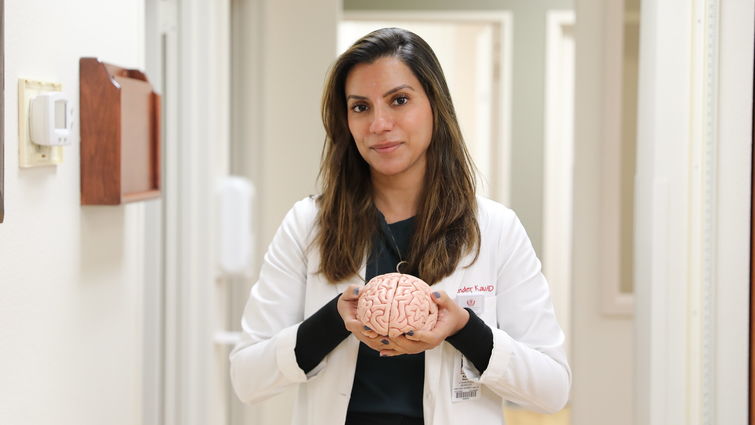

Dr. Kaur, MD, a neuro-oncologist, explains how a balanced, anti-inflammatory diet can improve the quality of life for those living with brain tumors
Brain tumors are a serious and often unpredictable medical condition, leaving many to wonder if prevention is possible. While society tends to think that lifestyle choices are a leading cause of cancers and tumors, Maninder Kaur, MD, a neurology specialist at Loma Linda University Health, says that the exact causes of primary malignant brain tumors remain largely unknown.
“There are some genetic syndromes that are familial, but those are rare, and many still remain to be explored,” Kaur explains. "But a lot of times, it’s the luck of the draw because we often don’t know what causes brain tumors."
As for environmental factors, beyond high levels of radiation exposure from places such as nuclear plants or chemicals from warfare, there is no direct scientific evidence linking lifestyle habits –– such as cellphone and microwave usage –– to the growth of brain tumors that we know of thus far via clinical studies.
While there are no known definitive ways to prevent brain tumors, researchers continue to explore the role of nutrition in managing and potentially reducing the risk of brain tumors.
Kaur says that inflammation caused by poor diet and toxins from smoking, alcohol, and drugs can harm the body’s ability to fight illness by increasing inflammation, depriving the body of necessary antioxidants, and further taxing the immune system. A healthy diet, while not a prevention of brain tumors, can help support the body’s natural defenses.
Brain tumors and their causes
Brain tumors are abnormal growths of cells in the brain that can be either malignant, which are cancerous, or benign, which are non-cancerous. Malignant brain tumors originate from cancer in another part of the body, such as the breast or lungs, which then spread to the brain.
A primary brain tumor, which begins in the brain itself, is the second most common type of tumor. They can be caused by genetic mutations and rarely are related to familial syndromes.
Nutrition’s impact on brain health
Though there is no guaranteed way to prevent a brain tumor, Kaur says maintaining a healthy diet can reduce overall risks and potentially slow the progression of brain tumors. Two diets that Kaur recommends are the Ketogenic and Mediterranean diets.
The Ketogenic (keto) Diet, which became popularized in the 1920s as a treatment for epilepsy, may help with brain tumors. Ongoing studies are looking at the benefit of the keto diet, specifically how it can alter the body's metabolism to deprive cancer cells of their primary fuel source — glucose. The keto diet is a high-fat, low-carbohydrate diet that shifts the body’s metabolism from using glucose as its primary energy source to burning fat for fuel, producing ketones in the process.
By drastically reducing carb intake and increasing fat consumption, the diet forces the body into a state called ketosis, where it relies on ketones for energy instead of sugar.
The Mediterranean Diet, which became popularized in the 1990s, emphasizes foods that are rich in antioxidants, healthy fats, fruits, and vegetables. Kaur recommends this diet because of its anti-inflammatory properties, which may help protect brain cells from oxidative stress and damage.
Additionally, Kaur notes that research suggests that a high-fiber, plant-based diet could have benefits for brain tumor patients, particularly by supporting overall health and potentially reducing cancer risk. Anti-inflammatory foods, such as berries, green tea, and omega-3-rich foods like salmon, can help reduce inflammation caused by the tumor or its treatment.
In addition to incorporating a nutrient-rich diet, Kaur says to avoid processed foods, red meat, and unhealthy fats to help reduce inflammation in the body.
Diet during treatment
For those undergoing treatment for brain tumors, including surgery, chemotherapy, and radiation, nutrition becomes even more critical.
“The body needs proper fuel to recover from surgery, cope with the side effects of chemotherapy, and repair damaged tissues,” Kaur says. “During treatment, patients should focus on nutrient-dense foods that are easy to digest and rich in protein, antioxidants, and healthy fats.”
The brain and the body
Beyond diet, there are other factors to consider when addressing brain health, such as sleep, emotional health, and exercise.
A good night’s sleep
Sleep is integral to maintaining brain health because it allows the brain to rest and regenerate, which is especially important for those fighting cancer. A good night's sleep is essential for brain health and can aid in recovery during and after cancer treatments.
Mental and emotional health
Research suggests that poor mental and emotional health has been shown to impact the progression of tumors. Kaur says that patients with strong mental and emotional support systems tend to experience better outcomes with practices such as mindfulness, meditation, and yoga, potentially slowing tumor growth and contributing to overall well-being.
Physical activity
Regular exercise has been shown to improve brain function and may contribute to overall wellness, which in turn can benefit patients undergoing treatment for brain tumors. While exercise alone cannot prevent or stop tumor growth, it enhances the body's ability to manage stress and fight inflammation, helping to maintain energy and mental clarity.
A balanced, anti-inflammatory diet rich in antioxidants and healthy fats, combined with regular exercise, adequate sleep, and a strong emotional support system, can enhance brain function and improve the quality of life for those living with brain tumors. Though research into the specific impact of diet on brain tumor prevention is ongoing, Kaur says the current consensus is clear: a healthy, whole-food diet can support the body’s ability to heal, maintain energy, and manage the effects of treatment.
For more information on the brain, visit our website here.


